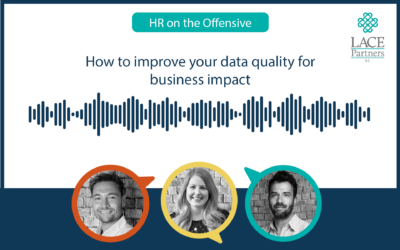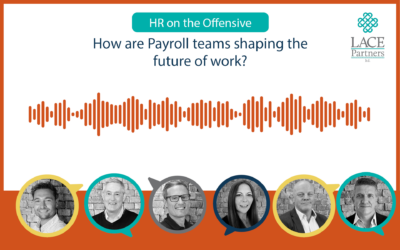
LACErs Chris Howard and Evan Wynne have recently invited Deirdre O’Shea, Associate Professor of Work and Organisational Psychology at the University of Limerick, to our podcast HR on the Offensive, to give an academic perspective on the state of wellbeing in organisations and how this impacts employees. Here are the key points of the interview.
EW: What is the science saying regarding the state of wellbeing and how does this affect organisations?
DOS: Wellbeing is a very general term and is different for individuals across different cultures. The easiest way to start thinking about it is how it contrasts or is similar to mental health. And, you know, we’re all very familiar with the concept of mental health.
Up to about 25-30 years ago, psychology was very much focused on how to prevent poor mental health and on what we sometimes think about as the negative side of wellbeing and mental health and how to prevent that.
People working in a place where they are not unwell are not necessarily thriving or at their best there. So, about 20 years ago or so, there was a movement in psychology that decided to not just think about how to prevent poorer types of mental health and wellbeing, but actually think more about how to enhance their positive side, and that became very popular.
From a psychological perspective, we think about mental health as a subjective sense of wellbeing. Do we feel well in the morning? Do we want to get up and go to work?
In part, this comes from the individuals themselves, and whether they’re happy in themselves, happy in their work and feel motivated by what they’re doing; in part, it comes from the workplace, how the work is designed and whether there’s too much – or too little – to do. It’s a matter of feeling stimulated in what we do.
CH: You mentioned this change in perspective started around 20 years ago. Has it accelerated post-pandemic?
DOS: I would not say so. There has been a shift over the last 15 or 20 years in society more broadly, which has also been followed then by workplaces and organisations, reducing the stigma around talking about mental health. We’ve seen many campaigns over the last 15-20 years about it’s OK to talk about it. It’s ok to say that you’re not ok.
This shift is happening in organisational culture as well, where I think employers now recognise that they have to consider employee wellbeing along with elements like performance.

CH: Is this shift a generational thing, driven by a new workforce happier to talk about mental health and wellbeing?
DOS: Yes, it’s something to do with the times that we live in, but probably even more with the context in which we’re operating. You know, if you went back to the 80s, it was very much about getting a job, keeping it, holding onto it; you had a job for life and you dealt with whatever you had to.
Now, despite going through recessions and boom times, we’re in a reasonably good job market. There’s relatively low unemployment, and of course, people can be more picky and choosy and will pick a job where they have more enjoyment, better benefits, more meaning. Whether it’s a generational thing or the type of environment, I don’t know, but certainly, I think people are looking to those organisations that would give them something beyond a paycheck.
EW: Do you think that organisations are prioritising employee wellbeing enough, or are they merely treating the symptoms rather than addressing the underlying issues?
DOS: That’s actually a really good question Evan, because I think that it gets to the cracks of the issue, which is you know, a focus on wellbeing as opposed to what might be causing people’s poor wellbeing in organisations. And that comes down to a number of factors, amongst which is how jobs are designed. There’s a long-running topic in HR around high-performance work systems and how we design work so that we align the organisational goals with the individuals and their work. However, sometimes we forget to think about, well, how much do people actually have to do? Can they do their jobs in enough time or the time that they have? Is there a reasonable expectation around that?

If we have really tight deadlines, if we’re not clear on our roles, we’re not sure what we’re doing or whether we’re doing things correctly, these things will cause us stress. The design of work and how we align work with people is an important aspect of maintaining people’s wellbeing in organisations. Of course, that’s a harder task than offering a lunchtime mindfulness course or something similar and saying we’ve ticked the box with wellbeing. Instead, provide supportive supervision, necessary instruments to carry out the job and adequate resources.
CH: You were talking about companies just ticking boxes, but how can they do more?
DOS: To be honest, many companies have started to make a genuine effort to improve their employee wellbeing. But they may buy off-the-shelf solutions, so we see for example couch to 5K, lunchtime mindfulness sessions. And it’s not that those things don’t have an impact or are not beneficial, but they may not be addressing the causes of poor mental health.
You could try to improve employees’ coping skills and build resilience, or improve their self-regulation skills and so on. How are teams interacting? Are they nice, do they trust each other? How is the work designed? These are slower things to change and require an organisational-level approach to it as opposed to providing individual solutions.
So, the biggest gap is actually diagnosing the cause of poor wellbeing. In a medical environment, we diagnose what the issue is, and then we put in place an appropriate solution. I think that’s not what we’re doing at the moment.

It’s a shame because many organisations do things like employee engagement or surveys and could make use of those tools that are actually tapping into some of the issues, potentially a very easy way to diagnose the issues themselves.
Organisations should genuinely consider the sense of meaning and purpose we get from our work or the feeling of a positive impact through our work and on others.
EW: Is it now the responsibility of organisations to consider employees’ demands outside of work as well?
DOS: Most workplaces will have family-friendly policies but I believe it’s a very important responsibility for workplace leaders to recognise the boundaries of work and set very clear expectations. Organisation signal that you shouldn’t be sending emails out of work hours or, if you are, to schedule them.
Line managers have a role in setting these expectations. It shouldn’t be just a sort of unwritten thing that it is ok to shut down at the end of the day.
There’s also really excellent research demonstrating that not only it is beneficial to have two weeks of summer holidays or summer vacation, but we need daily recovery from work to increase our energy for the next day.
EW: Talking of your daily recovery, Deirdre, what do you do to ensure you are recovered for your next work day?
DOS: As academics, we have a lot of autonomy to choose when and where we work and what we work on, you know, in terms of our research. It may become challenging to shut down at the end of the day though.
I do like running and cycling and triathlons, and most sport coaches would tell you that you should have goals around that. And it’s funny because that’s something I often struggled with; for me it’s more about my relaxation time and getting a bit of fresh air.
This is one way for me to recover, and many years ago I forgot about setting goals for my exercise and just decided that getting out was enough. So I’d say, do take time to do something that you enjoy.
EW: Do you see a societal impact caused by businesses focusing on employee wellbeing?
DOS: Economically, poor wellbeing is very expensive. Back in 2014, the EU estimated that poor wellbeing would cost the economy €240 billion per year and that comes from lost productivity, absences, etc. But more broadly, people’s work crossovers into their non-work lives and those of their families, spouses, children and so on. It’s what’s called emotional contagion, which has a huge societal impact.

CH: If we had a conversation in three – five years time, what would your hopes be about wellbeing for organisations and employees?
DOS: I would hope that organisations focus on providing decent, good-quality work. If you pay people properly, you provide them with appropriate support and resources to do their job, you have a sufficient number of people, then well-being should almost take care of itself, because people enjoy their work and love what they do. They not only wouldn’t have to worry about poor mental wellbeing, but actually, they should have good wellbeing as an outcome.
You can also listen to this episode in full on our podcast.
If you would like to talk to us about any issues relating to HR then fill in the form below and let us know in the comments section how we can help.






